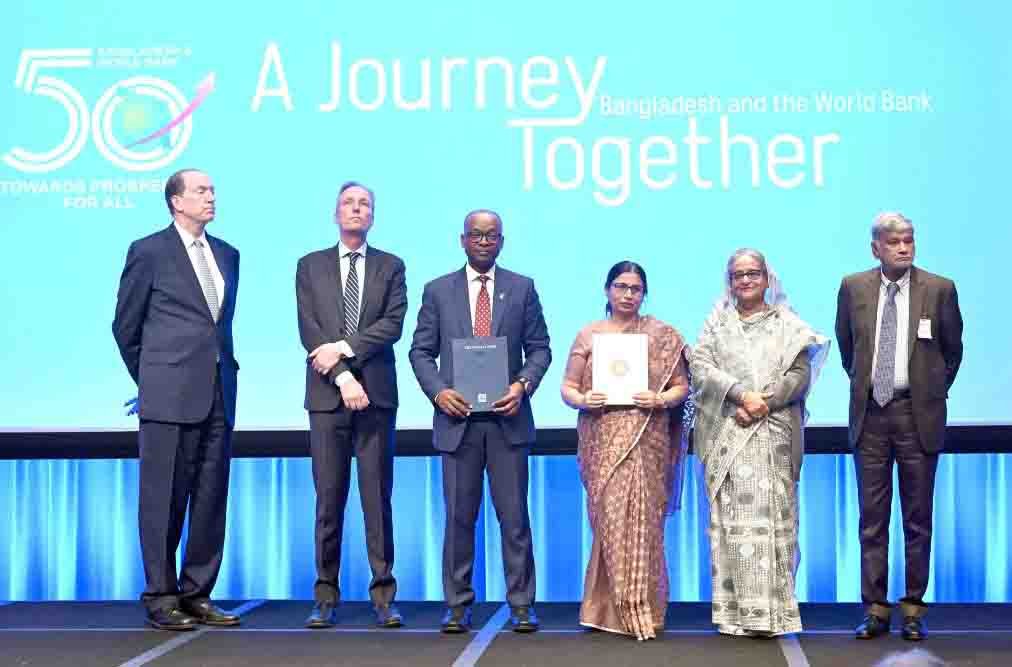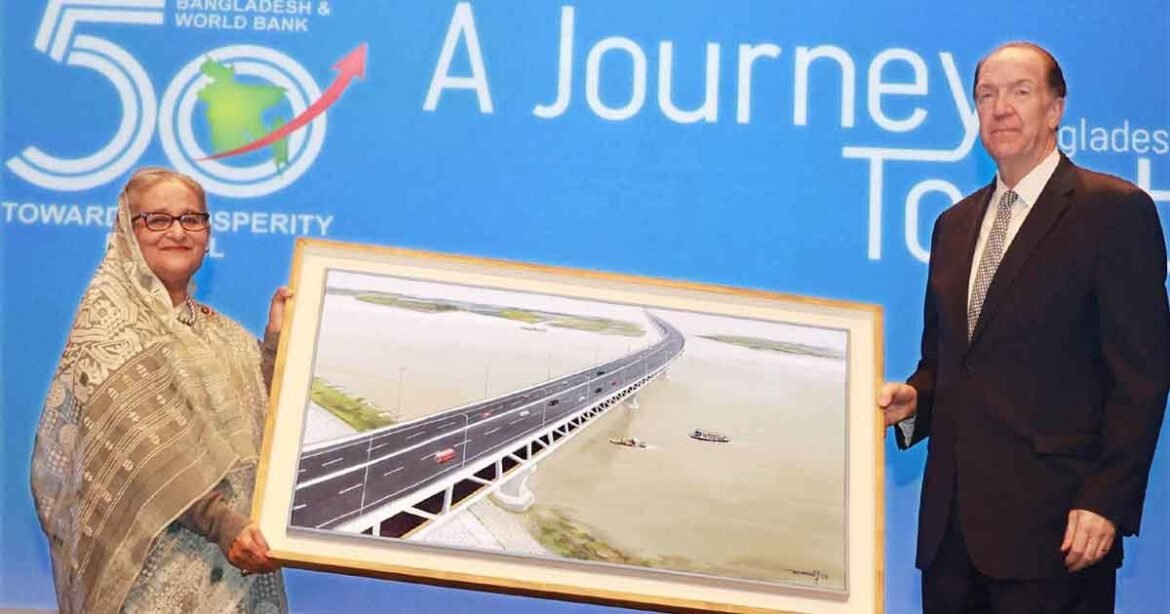In honor of the World Bank’s (WB) 50-year partnership with Bangladesh, Prime Minister Sheikh Hasina attended a ceremony in Washington, D.C., on Monday (May 1) at the invitation of WB President David Malpass. The celebration included round of discussions and concerns, an agreement signing and photo exhibition.
Launching photo exhibition on the occasion of 50 years of partnership
At the beginning of the program, the Bangladesh premier and the WB president jointly opened a photo exhibition commemorating the 50-year partnership between Bangladesh and the WB and walked through the exhibition’s main components. They walked through some of the exhibition’s main components.
PM Hasina stated that the photo exhibition conducted on the premises of the World Bank illustrated Bangladesh’s development, pledging to collaborate with the international lender for a brighter future. “I hope the World Bank will continue to remain with us on our exciting journey ahead to build a ‘Smart Bangladesh’. Let us work together in a spirit of shared trust for a brighter future,” she said.
“It speaks of our government’s determination to turn Bangladesh into a resilient and prosperous land,” PM Hasina said. She thanked the World Bank and other development partners for sharing the goals of inclusive economic growth. “Our common enemies are poverty and hunger, and we must not rest our case till we have won over them,” she said.
The premier also presented the president of the World Bank with an image of the Padma Multipurpose Bridge. She said, “Bangladesh will continue to invest in infrastructure and logistics for realizing our vision to become a high-income economy by 2041. I would expect the World Bank to engage in both our physical and social mega-projects in the coming years,”.
PM Sheikh Hasina stated that she believes the photo exhibition will serve as a reminder of their accomplishments and their ongoing efforts.

PM sought WB’s support for smooth LDC graduation transition
In the plenary session, Prime Minister of Bangladesh spoke on “Reflection on 50 Years of World Bank-Bangladesh Partnership” in the WB’s Preston Auditorium. During the program, Prime Minister Sheikh Hasina sought enhanced World Bank (WB) cooperation for Bangladesh’s transition to a developing nation, graduation as an upper-middle income country, and implementation of its Delta Plan-2100.
“Bangladesh is preparing for smooth and sustainable graduation from the UN LDC status in 2026. I request the World Bank to support our human capital and institutional capacity development programs for a smooth transition. The critical IDA window needs to be preserved and continued,” she said.
During the speech to the plenary session, the Prime Minister shared the WB with five specific recommendations that must be considered by the international lender in light of forthcoming development imperatives. She also stated that the World Bank must increase its investments in the development of state capabilities and sustainable development knowledge. The premier also thanked WB for specifically focusing on climate financing amid the global climate disasters.
WB and Bangladesh sign deal over five projects
On this occasion, Bangladesh and the World Bank signed a $2.5 billion agreement for the implementation of five initiatives on regional trade and connectivity, disaster preparedness, and environmental management. Bangladesh and the global lender inked a loan agreement at the WB headquarters.
The accord was signed in the presence of PM Hasina and WB President David Malpass.
The five projects include: Resilient Infrastructure Building Project (RIVER), Bangladesh Environmental Sustainability and Transformation (BEST), Accelerating Transport and Trade Connectivity in Eastern South Asia (ACCESS) –Bangladesh Phase-1, First Bangladesh Green and Climate Resilient Development (GCRD) and Sustainable Microenterprise and Resilient Transformation (SMART).
- The resilient infrastructure scheme, with a budget of USD 500 million for adaptation and vulnerability reduction, will be the first significant investment program to support Bangladesh Delta Plan-2100, as it will improve disaster preparedness against inland flooding.
- The second initiative on environmental sustainability and transformation in Bangladesh, valued at approximately USD 250 million, will assist Bangladesh in strengthening environmental management and promoting private sector participation in green investment.
- The third project, accelerating transport and trade connectivity in Eastern South Asia-Bangladesh phase-1, will help Dhaka enhance regional trade and connectivity with 753,45 million dollars.
- With USD 500 million, the country may fund its fourth green and climate resilient project, which would aid in its transition to climate-friendly growth.
- The fifth and final project on sustainable micro enterprise and resilient transformation will help transform the micro enterprise sector into one that is more dynamic, less polluting, resource efficient, and climate resilient.

PM Hasina bats for all developing economies
PM Hasina stated that the pandemic, armed conflicts, and climate emergency have placed the majority of developing economies under severe pressure.
PM pointed out, despite the multiple crises caused by the pandemic and armed conflict, some development partners have chosen to increase their lending costs and interest rates, which detract from their core mission. “I call upon the World Bank and other development partners to find viable alternatives so that our economies can cope better with the emerging challenges,” PM said.
She added saying, “There is an urgent expectation that the World Bank and other development partners deliver increased, concessional and innovative financing for SDG implementation.”
Defining Bangladesh as a living example of climate adaptation, including a number of nature-based and technological solutions, she said, “I invite the World Bank and other development partners to join us in implementing the projects under our Bangladesh Delta Plan 2100.”
WB recognizes Bangladesh as a role model for poverty reduction and women empowerment
David Malpass, president of the World Bank Group, has lauded Bangladesh’s resiliency and hailed the nation as a role model for many nations in terms of reducing poverty and empowering women. Additionally, he expressed his optimism for Bangladesh’s upcoming endeavors.
“I am confident that with the right set of policies and timely action, Bangladesh can achieve its growth aspirations,” he said while speaking at the celebration of 50 years of partnership.
According to the president of the World Bank, Bangladesh’s extraordinary journey was made possible by the indomitable spirit and resiliency of its people as well as a shared desire to create a thriving country.
Following the celebration, Malpass also tweeted: “Many countries can learn from Bangladesh’s innovative approaches to reducing poverty, empowering women, and adapting to climate change.”
He addressed Prime Minister Sheikh Hasina and said, “We are proud of our partnership and look forward to opening the next chapter together with you.”
According to the World Bank president, three lessons from Bangladesh’s development experience stand out and can inspire other nations: empowering women and girls, investing in people and connectivity, and taking immediate action on climate adaptation and resilience. As Bangladesh navigates through previously unheard-of global challenges, Malpass reaffirmed the World Bank’s strong support for the nation and its people.
Talks on Rohingya issue
The Prime Minister stated that they have been collaborating with the United Nations and other international organizations to ensure their safe, dignified, and voluntary repatriation to Myanmar, but no one has yet returned.
“The situation is getting increasingly difficult for us, with growing security implications for the wider region. I thank the World Bank for joining us in our humanitarian endeavor and for the USD 590 million grants for the Rohingya and their impacted communities,” she noted.
PM Hasina remarked that Bangladesh has provided refuge to the forcibly displaced Rohingya from Myanmar for the past four decades, and that their population has reached 1.2 million since their expulsion in August 2017 due to mass atrocity crimes.
Call for enhanced support in building “Smart Bangladesh”
The premier also spoke to the WB Board of Governors in the Shihata Conference Room on Monday. She stated that Bangladesh has never defaulted on loan repayments or fallen into a “debt trap,” urging global development partners such as the World Bank (WB) to continue investing in the digital and physical infrastructures to transform the country into a “Smart Bangladesh” by 2041.
“The present situation gives an indication of our economy’s growth opportunities and absorptive capacity and Bangladesh has never defaulted on its debt repayment, or fallen into a so-called “debt trap”,” she said.
PM Hasina stated that the government seeks a closer relationship with the World Bank. “We now wish to look into the future of our partnership. The World Bank must remain focused on its core purpose of poverty alleviation and development financing,” she said.
“The World Bank is actively engaged in our digital transformation. Our government has kept its words to our people by building together a ‘Digital Bangladesh’ by 2021. We have set our next target to become a knowledge-based ‘Smart Bangladesh’ by 2041,” PM Sheikh Hasina said. She also urged development partners such as the World Bank to continue investing in our physical and digital infrastructure.
Referring to a globally influential economy, PM Hasina stated, “We are currently the 35th largest economy in the world with a GDP of USD 460 billion. In South Asia, we are the second biggest economy and an emerging growth engine. We are graduating from the UN Least Developed Country (LDC) status, having qualified in all three criteria”.
“In 2022, our headcount poverty came down to 18.7%, with a sharp decline in extreme poverty to 5.6%. All this has happened despite the multi-dimensional challenges posed by the COVID-19 pandemic, the war in Europe, and the deepening climate crisis,” she added.
The Premier stated that the World Bank is now committed to 53 separate initiatives in Bangladesh totaling USD 15 billion, adding that this is a portion of the USD 39 billion in grants and loans that the Bank has offered to date. “Our strong performance in human capital formation is matched by our investment in infrastructure mega-projects. The construction of the 6.1 km Padma Multipurpose Bridge with Bangladesh’s own financial and technical resources is a sign of our economic maturity,” she said.
PM Sheikh Hasina was greeted with a bouquet of flowers upon her arrival at the World Bank headquarters in Washington, D.C. by its Country Director for Bangladesh, Abdoulaye Seck, and its SAR Vice President, Martin Raiser. At the event, a documentary entitled “Bangladesh-World Bank 50 Years of Partnership” was also shown. Foreign Minister Dr. AK Abdul Momen, Planning Minister MA Mannan, and PM’s Private Industry and Investment Adviser Salman Fazlur Rahman were present, among others.
Cover Photo credit: Yeasin Kabir Joy


